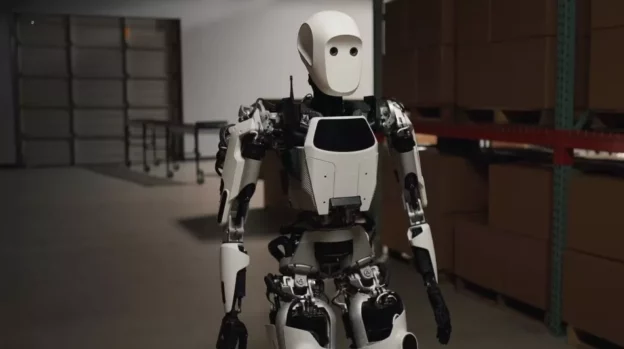News of humanoid robots is becoming more and more surprising; now Mercedes-Benz is testing humanoid robots to take on physically demanding and monotonous tasks in one of its factories, facing the challenge of finding “reliable workers”.
Apollo robots are the firm’s test models, which are manufactured by Apptronik to transport parts to assembly lines and perform quality inspections. These 5-foot, 8-inch tall robots, weighing approximately 160 pounds, have the ability to lift up to 55 pounds.
Jörg Burzer, a member of the Mercedes-Benz board of management, expressed in a statement the importance of robotics and artificial intelligence for the future of automotive production, noting that these advances offer new opportunities to support its specialized manufacturing workforce.
Apollo robots inside factories
Although robots have been part of the manufacturing process for decades, usually in the form of heavy arms to lift machinery, the Apollo robots represent one of the first uses of humanoid robots in a factory environment. Its humanoid design allows for greater factory automation without the need for costly changes in layout or production lines.
Companies such as Chinese startup Nio and BMW have already begun incorporating humanoid robots developed by UBTech Robotics and Figure, respectively, into their production lines, while Amazon has tested the robots Digit robots from Agility Robotics robots in its warehouses. Tesla has also been developing its Optimus humanoid robot since August 2021, although it has faced mixed reviews.
Mercedes-Benz tests humanoid robots: Will they replace humans?
Mercedes ‘ implementation of Apollo robot technology aims to automate low-skilled, physically demanding tasks, an approach that, according to Jeff Cardenas, CEO and co-founder of Apptronik, will likely be replicated by other organizations in the future.
Concerns about automation and artificial intelligence in the workplace are not new. A significant focus of U.S. labor activity last year was protecting workers from the risks of automation and AI, with unions fighting for limitations on the use of these technologies and for greater job security in industries that invest heavily in robots.
At the CES convention in January, robots that perform massages, serve coffee and more were unveiled, raising concerns among some attendees about the future of work and the possibility of robots replacing humans in their jobs. robots replacing humans in their jobs. .
Undoubtedly, the incorporation of humanoid robots in the automotive industry and beyond raises fundamental questions about the future of work, the ethics of automation and the role of artificial intelligence in society.
While these technological advances promise efficiency and savings, they also invite deep reflection on the importance of preserving the human element in an increasingly automated world. The transition to increased automation must be carefully managed to balance the technological benefits with the well-being and safety of the workforce.
Don’t miss any of our posts and follow us on social media!
Inspenet.com YouTube LinkedIn Facebook Instagram
Source: qz.com
Photo: Apptronik

